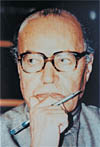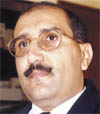Sheikh Ali Mohammed Al-Rassas [Archives:1997/51/Interview]
Solving Problem Issues in Al- Beida
Sheikh Ali Mohammed Al-Rassas is currently a member of the Local Administration Committee at the Consultative Council. Hailing from Al-Beidha, Sheikh Al-Rassas, 53, became a director of the Markha region after the revolution, then a member of the Shoura Council in 1972, a member of the People’s Founding Council, and later a member of parliament after unification. Due to the fighting with the Imam, he had to do his schooling in various areas such as Miswarah and Beihan. Dr. Salah Haddash, Yemen Times Managing Editor, talked to Sheikh Al-Rassas and filed the following interview. Excerpts:
Q: What are the general circumstances in Al-Beidha governorate now? A: The situation in Al-Beidha was quite bad during the rule of the Socialist Party, despite it being a strategic border region. Public services were far from adequate. Many left Al-Beidha, especially the businessmen and the educated elite. However, the development projects currently taking place in the area are enticing some people to come back to their homeland. So generally speaking, the situation is now better than it used to be in the past.
Q: What has been done regarding the problem of water scarcity in Al-Beidha? A: The study conducted by the Consultative Council covers all Yemen, not only Al-Beidha. Water in Al-Beidha is mainly on the surface, there is little underground. This problem should really be solved, considering that the area is quite fertile. In the fertile valleys of Beihan and Markha the rich soil is sometimes 15 to 30 m deep. If certain areas in Al-Beidha are properly and fully farmed, they can cover the needs of most other governorates in Yemen. Lack of water for irrigation has driven many people out of their farms. Recently, however, the General Water Authority has started implementing several water projects in the area, a task for which we are very grateful.
Q: Are there any major agricultural projects in Al-Beidha? A: I am afraid that there no such big projects. It is mostly done through individual efforts. Framers successfully grow onions, garlic, and citrus fruits. But this season farmers had to sell the sack of onions for YR 200 only due to their inability to market their products in other areas of Yemen. The recent increase in diesel prices is not helping, either. The government’s support of agriculture in Al-Beidha is still not sufficient.
Q: Can’t the Agricultural Bank help out? A: Farmers in general are unable to meet the conditions of borrowing as stipulated by the Agricultural Bank. Even if they can meet these conditions, some people refrain from borrowing and paying back with interest out of religious observance. Agriculture is becoming expensive. For instance, it costs around YR 1,200 to hire a tractor for one hour, not to speak of the required fertilizers, pesticides, the water pump, etc. These have surpassed the means of many people. What the income farmers get for their produce is just not sufficient any more.
Q: Are there any NGOs and agricultural cooperatives? A: No, I am afraid not. There are only charities for helping the poor and the destitute.
Q: Do the emigrants from Al-Beidha help their relatives who are still at home? A: Very little. Most of the emigrants from Al-Beidha went to Saudi Arabia and the Gulf countries. They were deported during the Gulf crisis in 1990.
Q: It is rumored that some MP and members of the Consultative Council take money in return for helping their constituents. How true is this? A: I have solved many problems and provided many services for my area without a single riyal in return. I sometimes have to spend a long time in Sanaa to work on my people’s behalf, and only see my family for two days a week. Some citizens, out of ignorance or mistaken belief, try to thrust money onto their MP. It is just in their blood, despite being poor. So you see people follow and admire the person who takes money from them in return for favors. I don’t do that.
Q: Let’s now talk about health care and education. How adequate are these services in Al-Beidha? A: There is the Al-Bawa general hospital in the center of the governorate and a few public and private health centers scattered around the region. Generally speaking, the health services in Al-Beidha are still not sufficient. Most areas in Al-Beidha have adequate schools, compared to the 1980s.
Q: Is there any environmental pollution in Al-Beidha? A: Although there are no major industries in the region, pollution does exist. It is mainly in the form of garbage and sewer pollution due to the negligence of some of the municipal authorities.
Q: Is there an adequate road network within Al-Beidha? A: Most villages are connected with the major urban centers in the governorate by decent roads. Work is now underway to construct a major road to connect Al-Beidha with Shabwa, passing through Sawmaa and Miswara.
Q: Do people in Al-Beidha experience electricity shortages? A: Yes, this issue has been a source of headache for some time. Lately, however, a power station has been installed in Al-Khazan area.
Q: So what are the governorate’s major needs? A: Al-Beidha’s top priority now is to build dams in order to provide sufficient water for irrigation.
Q: Could you tell us a little about the traditional handicrafts in Al-Beidha? A: Many of the traditional handicrafts have all but disappeared. Other more practical crafts and traditional professions such as carpenters and blacksmiths still flourish. Weavers, for example, are now very few.
Q: Is the natural life in Al-Beidha endangered in any way? A: There used to be many kinds of animals which people hunted for their meat, rather than for pleasure or trade. Some of the animals are quite rare now such as the deer and a few species of birds.
Q: Being a border region, is there any smuggling into and out of Al-Beidha? A: No, there is none. Smuggling may exists in other parts of the country, but not in Al-Beidha. Laxity in the administration is to blame for that.
Q: Is there any problem regarding the proposed administrative divisions? A: We don’t have a particular problem in this area. However, I can understand the objections made by people in other parts of the country. Tribal and regional allegiances are still very much strong.
Q: How do you evaluate the performance of the Consultative Council so far? A: The Consultative Council consists of very prominent and wise people, but their powers are limited. The President is a good man who cares about the well-being of all people. But we ask God to guide the President’s men to what is good for the nation. I don’t mean the members of the Consultative Council, most of whom have still not had the chance to meet the President since their appointment. They only see him on TV. This is the truth. Without undo flattery, the President is a good man, and wants good for all Yemen. The Consultative Council is facing many obstacles. It has no legislative power, but can only provide advice and opinion to the President. Despite all that and despite many members absent themselves for some reason or another, the Consultative Council is quite active.
Q: Could you briefly tell us about the issue of blood feuds and the carrying of firearms that was recently discussed by the Consultative Council? A: Blood feuds in Yemen represent an age-old problem. The solution is not easy. I believe that a republican decree will have to be issued licensing the killing of anyone who commits a blood revenge murder within the capital and other major town and cities. Tribal traditions dictated that a murderer must be banished from society. People used to feel safe when they entered town and cities. Now the opposite is true – people are afraid to leave their little villages to go into town. If such a decree is enforced properly, it will become a strong deterrent for anyone who contemplates executing a blood revenge murder inside a town or a city. Of course, the law must be impartially applied on all citizens irrespective of their status in society. A blood revenge murderer must simply have his own blood shed with impunity. Secondly, a general state of reconciliation must be declared, and must remain in force for at least two or three years. During this period of good will, the state should carry out an intensive media campaign to raise public awareness. It should be made quite clear that blood feuds are simply unacceptable. Also, meeting should be held in all governorates where the governor, the security people, the tribal sheikhs and elders can get together in order to reach comprehensive reconciliation among the feuding factions. The relevant republican decree can be properly formulated during this period of respite. The other important matter which is closely associated with, and is often the cause of blood feuds is land disputes. Land disputes, very prevalent nowadays, must be tackled, fairly and squarely. So it is really a matter of addressing the cause first, and the effect second. Again the state must intervene in solving land disputes, rather than leaving the tribes to their own devices. Blood feuds in Al-Beidha are not that widespread as is the case in Sanaa or Mareb.
Q: How about the problem of carrying firearms? A: It could prove to be quite difficult to persuade people, especially in the countryside, to put their weapons away while everybody in other parts of the country insist on carrying theirs. However, this problem is less pronounced in urban centers within Al-Beidha.
——
[archive-e:51-v:1997-y:1997-d:1997-12-22-p:./1997/iss51/intrview.htm]


